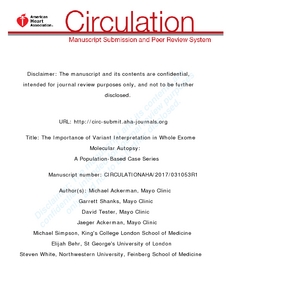Shanks, GW; Tester, DJ; Ackerman, JP; Simpson, MA; Behr, ER; White, SM; Ackerman, MJ
(2018)
Importance of Variant Interpretation in Whole-Exome Molecular Autopsy: Population-Based Case Series.
Circulation, 137 (25).
pp. 2705-2715.
ISSN 1524-4539
https://doi.org/10.1161/CIRCULATIONAHA.117.031053
SGUL Authors: Behr, Elijah Raphael
![[img]](https://openaccess.sgul.ac.uk/109963/1.hassmallThumbnailVersion/CIRC_CIRCULATIONAHA-2017-031053_merge_R1.pdf)  Preview |
|
PDF
Accepted Version
Available under License ["licenses_description_publisher" not defined].
Download (676kB)
| Preview
|
Abstract
BACKGROUND: Potentially lethal cardiac channelopathies/cardiomyopathies may underlie a substantial portion of sudden unexplained death in the young (SUDY). The whole-exome molecular autopsy represents the latest approach to postmortem genetic testing for SUDY. However, proper variant adjudication in the setting of SUDY can be challenging. METHODS: From January 2012 through December 2013, 25 consecutive cases of SUDY from 1 to 40 years of age (average age at death 27±5.7 years; 13 white, 12 black) from Cook County, Illinois, were referred after a negative (n=16) or equivocal (n=9) conventional autopsy. A whole-exome molecular autopsy with analysis of 99 sudden death-susceptibility genes was performed. The predicted pathogenicity of ultrarare, nonsynonymous variants was determined using the American College of Medical Genetics guidelines. RESULTS: Overall, 27 ultrarare nonsynonymous variants were seen in 16/25 (64%) victims of SUDY. Among black individuals, 9/12 (75%) had an ultrarare nonsynonymous variant compared with 7/13 (54%) white individuals. Of the 27 variants, 10 were considered pathogenic or likely pathogenic in 7/25 (28%) individuals in accordance with the American College of Medical Genetics guidelines. Pathogenic/likely pathogenic variants were identified in 5/16 (31%) of autopsy-negative cases and in 2/6 (33%) victims of SUDY with equivocal findings of cardiomyopathy. Overall, 6 pathogenic/likely pathogenic variants in 4/25 (16%) cases were congruent with the phenotypic findings at autopsy and therefore considered clinically actionable. CONCLUSIONS: Whole-exome molecular autopsy with gene-specific surveillance is an effective approach for the detection of potential pathogenic variants in SUDY cases. However, systematic variant adjudication is crucial to ensure accurate and proper care for surviving family members.
| Item Type: |
Article
|
| Additional Information: |
This is a non-final version of an article published in final form in Shanks, GW; Tester, DJ; Ackerman, JP; Simpson, MA; Behr, ER; White, SM; Ackerman, MJ (2018) Importance of Variant Interpretation in Whole-Exome Molecular Autopsy: Population-Based Case Series. Circulation, 137 (25). pp. 2705-2715. |
| Keywords: |
cardiomyopathies, channelopathies, genetics, sudden death, cardiomyopathies, channelopathies, genetics, sudden death, cardiomyopathies, channelopathies, genetics, sudden death, Cardiovascular System & Hematology, 1103 Clinical Sciences, 1102 Cardiovascular Medicine And Haematology, 1117 Public Health And Health Services |
| SGUL Research Institute / Research Centre: |
Academic Structure > Molecular and Clinical Sciences Research Institute (MCS) |
| Journal or Publication Title: |
Circulation |
| ISSN: |
1524-4539 |
| Language: |
eng |
| Dates: |
| Date | Event |
|---|
| 19 June 2018 | Published | | 18 June 2018 | Published Online | | 9 November 2017 | Accepted |
|
| Publisher License: |
Publisher's own licence |
| PubMed ID: |
29915097 |
| Web of Science ID: |
WOS:000435466800006 |
 |
Go to PubMed abstract |
| URI: |
https://openaccess.sgul.ac.uk/id/eprint/109963 |
| Publisher's version: |
https://doi.org/10.1161/CIRCULATIONAHA.117.031053 |
Statistics
Item downloaded times since 11 Jul 2018.
Actions (login required)
 |
Edit Item |



